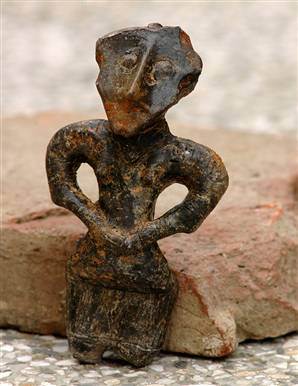From the original article on November 27, 2007. Author: Chateau Heartiste.
I was always amused by people — especially women who seem to have a universal knee-jerk distaste for the idea that beauty can be measured and ranked — who believed that culture, or the media, or Hollywood, or parents, or peers, or the magic nose goblin, were somehow responsible for what gives men boners. The religion of cultural conditioning is as cultic as any organized religion. It has many adherents because, like traditional religions, it appeals to false hopes and placates with soothing lies.
No magazine, TV show, movie, or “groupthink” ever influenced the blood flow to my manhood. Nor does it do so for any other man. When my balls grew hair, the first time I saw a silky thigh was like a thermonuclear blast of lust that fried my brain. My heart raced when I laid eyes on a pretty girl. Nothing influenced this visceral reaction; it was as hardwired as breathing and shitting.
So when my buddies and I go out I am never surprised when we almost always agree on the top three hottest girls in the venue. If you gathered every guy in a bar on a busy Saturday night and asked them to rank the girls the same ones would appear on the tops of all their lists. You don’t need scientific studies to prove what common sense already tells you — that beauty is not subjective if men all agree on which girls are beautiful.
But for those who live in a world of self-delusion and get hives when the words evolutionary psychology are mentioned, there is now a growing body of studies in the neurosciences to buttress casual observation that not only is female beauty objective, but so is beauty in the arts.
This study found that an abstract sense of beauty is at least partly innate.
When people were shown pictures of sculptures in a new study, brain scans suggest they judged beauty by at least partly hard-wired standards.
Researchers in Italy showed volunteers original and distorted images of Classical and Renaissance sculptures. The scientists picked 14 volunteers with no experience in art theory to try to see what role pure biology had to do with judging art.
The proportions of the sculptures in the study followed the golden ratio. And the original images of them strongly activated sets of brain cells that the distorted images did not—including the insula, a brain structure that mediates emotions.
“We were very surprised that very small modifications to images of the sculptures led to very strong modifications in brain activity,” researcher Giacomo Rizzolatti, a neuroscientist at the University of Parma, told LiveScience.
In addition, instead of asking volunteers to simply enjoy these pictures, the researchers also had them judge how beautiful or ugly each was. The images thought of as beautiful activated the right amygdala, a brain structure that responds to memories laden with emotional value. (The original images were often judged by the test subjects as more beautiful than distorted ones.)
The results indicate that the sense of beauty is based on hard-wired notions triggered in the insula and one’s experiences, and then activated in the amygdala. Still, the scientists caution the findings cannot necessarily be generalized across cultures.
The conclusions of this study support the notion that the fingerpainting known as modern “art” is a fraud perpetrated on the masses by elitist snobs who needed to devise a false criteria for separating themselves from the gauche plebes.
Here is a study that shows men’s preferences for a female 0.7 waist to hip ratio has a real basis in biological necessity.
Controlling for other correlates of cognitive ability, women with lower WHRs and their children have significantly higher cognitive test scores, and teenage mothers with lower WHRs and their children are protected from cognitive decrements associated with teen births. These findings support the idea that WHR reflects the availability of neurodevelopmental resources and thus offer a new explanation for men’s preference for low WHR.
Summary: evolution designed men to prefer sexy hourglass figures because women who have them give birth to smarter babies.
This archaeological discovery suggests that prehistoric women shared the same tastes in slutty fashion as modern women.
“According to the figurines we found, young women were beautifully dressed, like today’s girls in short tops and mini skirts, and wore bracelets around their arms,” said archaeologist Julka Kuzmanovic-Cvetkovic.

prehistoric boy shorts underneath
She looks pretty thin. So much for the hypothesis that men used to like fat girls before the evil fashion industry warped their minds to chase after thin girls. 7,500 hundred years ago men lusted for a hot bod in a mini skirt, same as today. And, same as today, women knew what turned men on.
There are mountains of papers which show that beautiful faces of both sexes have traits in common. And that what is beautiful and what is ugly is not a mystery or in the eye of the beholder. Case in point:

i eat babies.

these lips were made for blowing.
A tsunami of evidence from the neurosciences (as opposed to the soft sciences of sociology and cultural anthropology where radicals with axes to grind have created a mutual masturbation society of feelgood lies) is slowly and inexorably repudiating decades of dearly-held and rabidly guarded cherished beliefs.
There will be much wailing and gnashing of teeth as their rancid ideology is ground to dust. And I will taste their tears of unfathomable sadness...mm, so yummy and sweet!
Library of Chadnet | wiki.chadnet.org